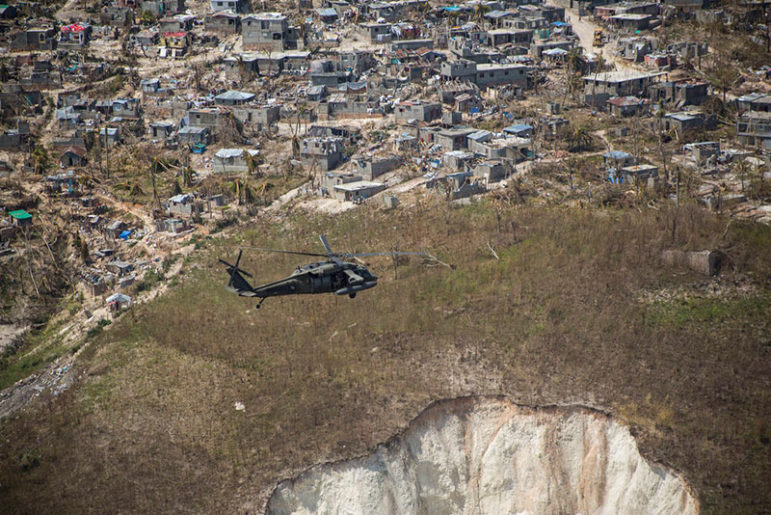
November 3, 2016; Washington Post
The day after writing, “A month after Hurricane Matthew, 800,000 Haitians urgently need food,” Nick Miroff, a Washington Post correspondent for Latin America, came back with an update: “Reporters aren’t supposed to give things to the people they interview. But in Haiti, I did.” Such is the degree of misery and want that Haitian-Americans are rallying to supplement the limited international aid effort.
Southern Haiti right now is a place living on scraps. The scraps of the storm wreckage. The scraps of international aid.
The Category 4 storm wreaked total destruction on crops, food stock, and livestock in the worst-affected areas, leaving more than 800,000 people, including more than 112,000 children, at risk of acute malnutrition if not starvation. The needs are vast and comprehensive, from clean water and shelter to child protection and health care. The UN estimates that there are 1.4 million people in urgent need of humanitarian assistance, and an estimated 40 percent of them are children. Only 33 percent of the UN emergency humanitarian appeal for $120 million has been received.
Miroff and the UN report that the humanitarian response is better coordinated and more effective than in the aftermath of the 2010 earthquake, if only because so many NGOs are still in place. UNICEF and its partners are providing 100,000 people a day with safe water, organizing a cholera vaccination campaign that will be launched next week to immunize up to 900,000 people. (Readers of the NPQ nonprofit newswire will remember that the UN is responsible for unwittingly bringing cholera to Haiti in their response to the 2010 earthquake.) They will also distribute cholera prevention kits containing such essentials as water purification tablets, soap, and oral rehydration salts.
The Haitian diaspora, particularly in Brooklyn where the largest concentration of Haitians in the U.S. reside, are responding. 4 Haiti New York City (4HNYC) was formed after the 2010 earthquake to deliver aid to schoolchildren. Now, they are expanding their efforts to meet humanitarian needs. Volunteers have been gathering at Haitian restaurants, bakeries, and other establishments to organize and collect donated medical supplies.
Sign up for our free newsletters
Subscribe to NPQ's newsletters to have our top stories delivered directly to your inbox.
By signing up, you agree to our privacy policy and terms of use, and to receive messages from NPQ and our partners.
Dr. Mathieu Eugeneis, the first Haitian-born official elected to the New York City Council (40th District, most of Brooklyn), introduced Resolution 687, “establishing October 9th annually as New York City Haitian Day, in recognition of the historic contributions of the Haitian diaspora to the City of New York.” He is advocating now for Congress to make the day a national holiday. Examples abound of other Haitian-American relief efforts in the aftermath of Hurricane Matthew.
Nevertheless, the need is so vast and threatening, much more is required of the concerned nations and NGOs. Remote mountain villages are inaccessible. Miroff reports that it will not be until the end of November that relief efforts can reach them.
“One man who walked out of the mountains recently after hiking two days told authorities that too many people had died in his town to bury the bodies, so villagers burned them and put the ashes in the river.”
The aid organization Doctors Without Borders recently sent staff by helicopter to one village, Pourcine, to investigate reports of a patient with cholera, only to find 20 stricken from it. The disease spreads rampantly once the bacteria enters the water supply. “We are sending materials to contain the epidemic, but there are people dying from cholera every day,” said Emmanuel Massart, the group’s field coordinator in Grand’Anse.
Visits to ReliefWeb, which offers updates on crises around the word, are sobering. There is almost infinite need competing with the deprivations in Haiti. It does not help that the Red Cross and others are still reeling from the damage done to their reputations and donor relations when shortcomings were revealed about their response to the 2010 earthquake. Haitian-Americans like Dr. Eugeneis are doing what they can to raise awareness and material support for their families and friends in Haiti while also working to change the narrative about their country of birth.—James Schaffer













